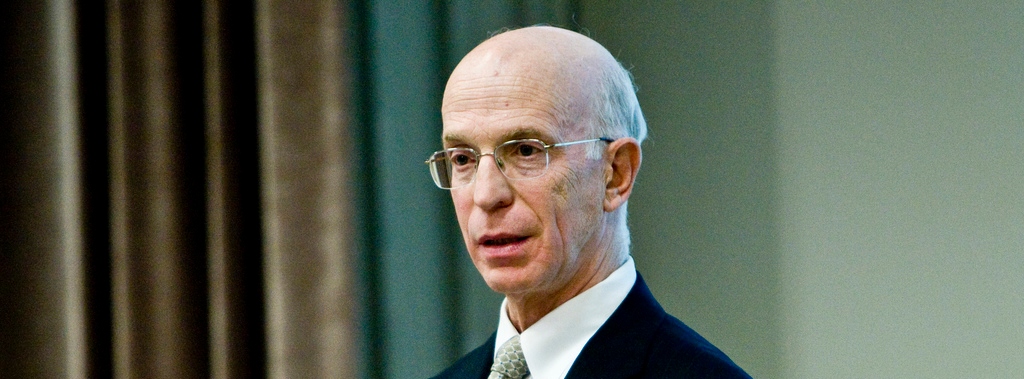Comments
- No comments found

Alan Blinder is one of the world's most influential economists.
Blinder delivered the 2023 Daniel Patrick Moynihan Lecture in Social Science and Public Policy to the American Academy of Political and Social Science last October on the topic “Economics and Politics: On Narrowing the Gap”. Here are some of the nuggets that caught my eye.
On the extent to which much economists influence politics
May I start by dispelling a myth? Perhaps because economists are frequently trotted out to support or oppose policies, perhaps because we have a Council of Economic Advisers right in the White House, perhaps because the powerful Federal Reserve—so ably represented here today–is dominated by economic thinking, many people believe that economists have enormous influence on public policy. In truth, apart from monetary policy, we don’t. Almost a half century ago, George Stigler (1976, p. 351), later a Nobel prize winner, wrote that “economists exert a minor and scarcely detectable influence on the societies in which they live.” Stigler was no doubt exaggerating to make his point. But he had a point. And things have not changed much since.
On the time horizons of politicians
It is a commonplace that politicians have excruciatingly short time horizons. It is often said that they can’t see past the next election, but the truth is far worse. The political pros who advise politicians often can’t see past the next public opinion poll, maybe not even past the next tweet. Their natural time horizon extends only until that evening’s news broadcasts, if that long.
Advice to economists who want to participate in policy debates
Let me now turn to the minority of economists who wish to get engaged in policy. I have two suggestions to offer here … Both suggestions cut deeply against the grain. They are not what we teach in graduate school. …
I have just emphasized that political time horizons are too short for sound economic policy. But it’s also true that economists’ time horizons are toolong for politics. Specifically, we economists typically focus on the “equilibrium” or “steady state” effects of a policy change. For example: What will happen eventually after a change in the tax code or a trade agreement? Don’t get me wrong. Those questions are important and highly pertinent to policy making. We should not forget about them. But they are close to irrelevant in the political world because people don’t live in equilibrium states. Rather, they spend most of their lives in one transition or another. Yet economists often brush off “transition costs” as unimportant details. We shouldn’t. …
The process of adjustment to the superior free-trade equilibrium may be lengthy and painful, involving job losses, reduced incomes for some, decimated communities, and more. Economists know all this but don’t pay it enough heed. Politicians, by contrast, live in the real world of ever-present transition costs. They may not be in office long enough to enjoy the steady-state benefits. …
My second suggestion is that economists pay far more attention to issues of fairness rather than doting almost exclusively on efficiency, as we often do. In politics, perceived fairness almost always trumps efficiency—and politicians understand that. … Think, for example, about debates over the tax code, which are hardy perennials in Congress. Economists have a beautiful theory of optimal taxation, built around maximal efficiency. But that theory plays absolutely no role in congressional debates. Zero. Discussions of fairness, on the other hand, dominate the debates. And we get the tax mess that we do. …
So here’s my advice to economists interested in actual–as opposed to theoretical–policymaking. Don’t forget about efficiency. It matters. We are right about that. But we may have to content ourselves with nibbling around the edges, below the political headline level, to make the details of a complex policy package less inefficient. Call it the theory of the third or fourth best.
Timothy Taylor is an American economist. He is managing editor of the Journal of Economic Perspectives, a quarterly academic journal produced at Macalester College and published by the American Economic Association. Taylor received his Bachelor of Arts degree from Haverford College and a master's degree in economics from Stanford University. At Stanford, he was winner of the award for excellent teaching in a large class (more than 30 students) given by the Associated Students of Stanford University. At Minnesota, he was named a Distinguished Lecturer by the Department of Economics and voted Teacher of the Year by the master's degree students at the Hubert H. Humphrey Institute of Public Affairs. Taylor has been a guest speaker for groups of teachers of high school economics, visiting diplomats from eastern Europe, talk-radio shows, and community groups. From 1989 to 1997, Professor Taylor wrote an economics opinion column for the San Jose Mercury-News. He has published multiple lectures on economics through The Teaching Company. With Rudolph Penner and Isabel Sawhill, he is co-author of Updating America's Social Contract (2000), whose first chapter provided an early radical centrist perspective, "An Agenda for the Radical Middle". Taylor is also the author of The Instant Economist: Everything You Need to Know About How the Economy Works, published by the Penguin Group in 2012. The fourth edition of Taylor's Principles of Economics textbook was published by Textbook Media in 2017.
Leave your comments
Post comment as a guest